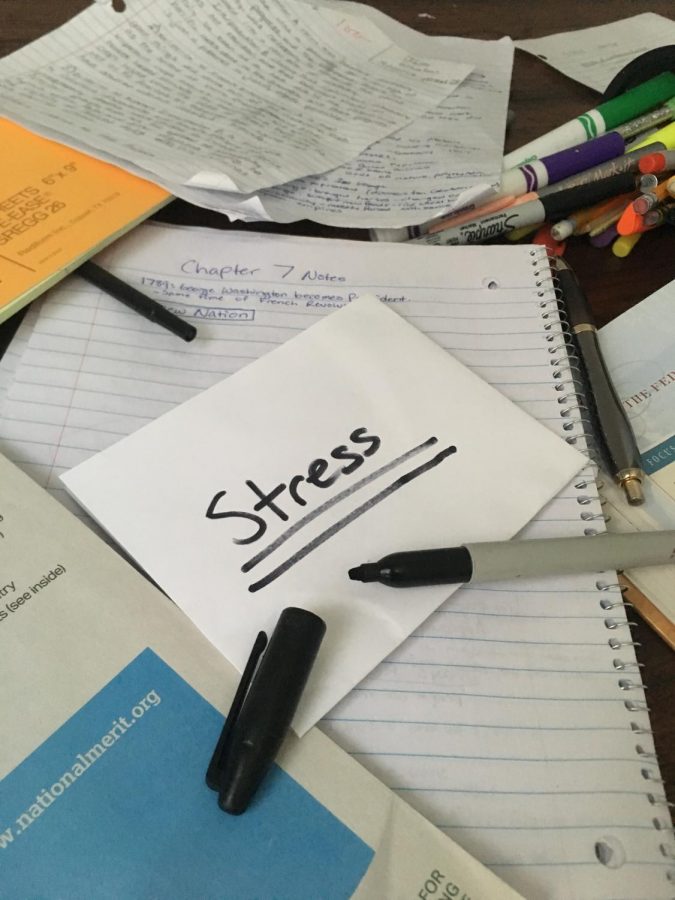Information Overload
The amount of stress, responsibilities and expectations for teens is becoming a problem- here’s how we can fix it.
A messy desk filled with papers is a common piece of furniture in the room of a teenager in 2018.
October 1, 2018
I’m only in my third year of high school, and yet it feels as though I’m having a mid-life crisis. Exhaustion has become a part of my natural personality, and staying up until midnight has become a nightly occurrence, not just a New Year’s Eve festivity. The length of my to do list would rival Santa Clause’s. I feel like a computer constantly stuck in a state of buffering from too many tabs being open, a fried hard drive due to a serious case of information overload. Although I am aware that I’m very fortunate to live a full and busy life, I have to say it: this computer is in dire need of a reboot.
I am not alone in my feelings of being overwhelmed: a 2015 study from New York University suggests that in recent years, many high school students have reported that they are experiencing abnormal levels of chronic stress, which has been shown to interfere with their mental health and abilities to succeed. The research is proven, but the question remains: why are so many teenagers across America becoming more stressed out in this day and age? The answer is clear, at least to me: a blend of pressure from academic institutions and society to meet nearly unachievable standards has caused teenagers to run out of storage space in their brains and fizzle out.
As teenagers, it seems we are constantly having to shift between different versions of ourselves throughout the day. We are students, desperately cramming knowledge into our crowded brains so we can pass the seemingly endless pile of exams. We are athletes, putting in blood, sweat and tears on the fields, in the pools, and on the courts, training rigorously to become champions. We are employees, taking customers’ orders and scanning grocery store items and handing people their receipt. We are friends, emotional pillars of support and shoulders to cry on when are friends need to vent or let out their frustrations. We are family members, doing household chores like sweeping the kitchen floors, and interacting with our brothers and sisters throughout the day. Sometimes, however, because we open up all of these tabs in our brain, it becomes difficult shifting between these versions, and the web browser will eventually crash.
So what do we do to fix this? Combating this troubling crisis of information overload festering within today’s youth is a complex problem that does not have a quick and simple answer. However, there are small steps we can take as a community to at least start. The first is meditation. Throughout the school day, hundreds of tidbits of information are constantly being hurled at us with little time to take it all in. Setting as little as ten minutes aside of each class to help students relax and process this information is not only a logical step, but a research-backed remedy. A recent Harvard study showed that spending just 10 minutes a day meditating and practicing mindfulness has positive effects on the brain, and helps ease stress. The classroom is the perfect place to integrate this method: if each class could set only 5 minutes a day to have meditation, or at least some form of quiet time, perhaps it would be easier for students to slow down and update their hardware to the latest version.
There have been times when I have skipped school because I was too mentally overwhelmed to go. This is not unique to just me: stress has become so prominent in high schools that many teens have resorted to faking sickness to stay home: not for an extensive tour of Chicago like Ferris Bueller, but to catch up on all of the papers, projects and essays. While this at first may not seem like a great idea, being allowed a certain number of days to catch up on schoolwork could be beneficial to students. In Homedale, Idaho, students only have a four day school week, which has shown an improvement in students’ mental health and has helped improve their grades. While the situation in Homedale is a bit drastic, perhaps Frisco could be inspired to allow students a certain amount of days allowed to take off from school to help them catch up, similar to a set number of sick days from work. These days could be very useful to helping students catch up in the fast-paced world we live in.
A lot is expected of teenagers: get eight hours of sleep, do your homework, have a flourishing social life, get a job and learn about independence, be mature, be kind, be patient, be positive. But hey, being a teenager is the best and easiest time of your life, they say. But this problem is not unsolvable: there are realistic and practical steps that we as a community can take to help today’s youth reboot from this troubling case of information overload.
[/infographic]




